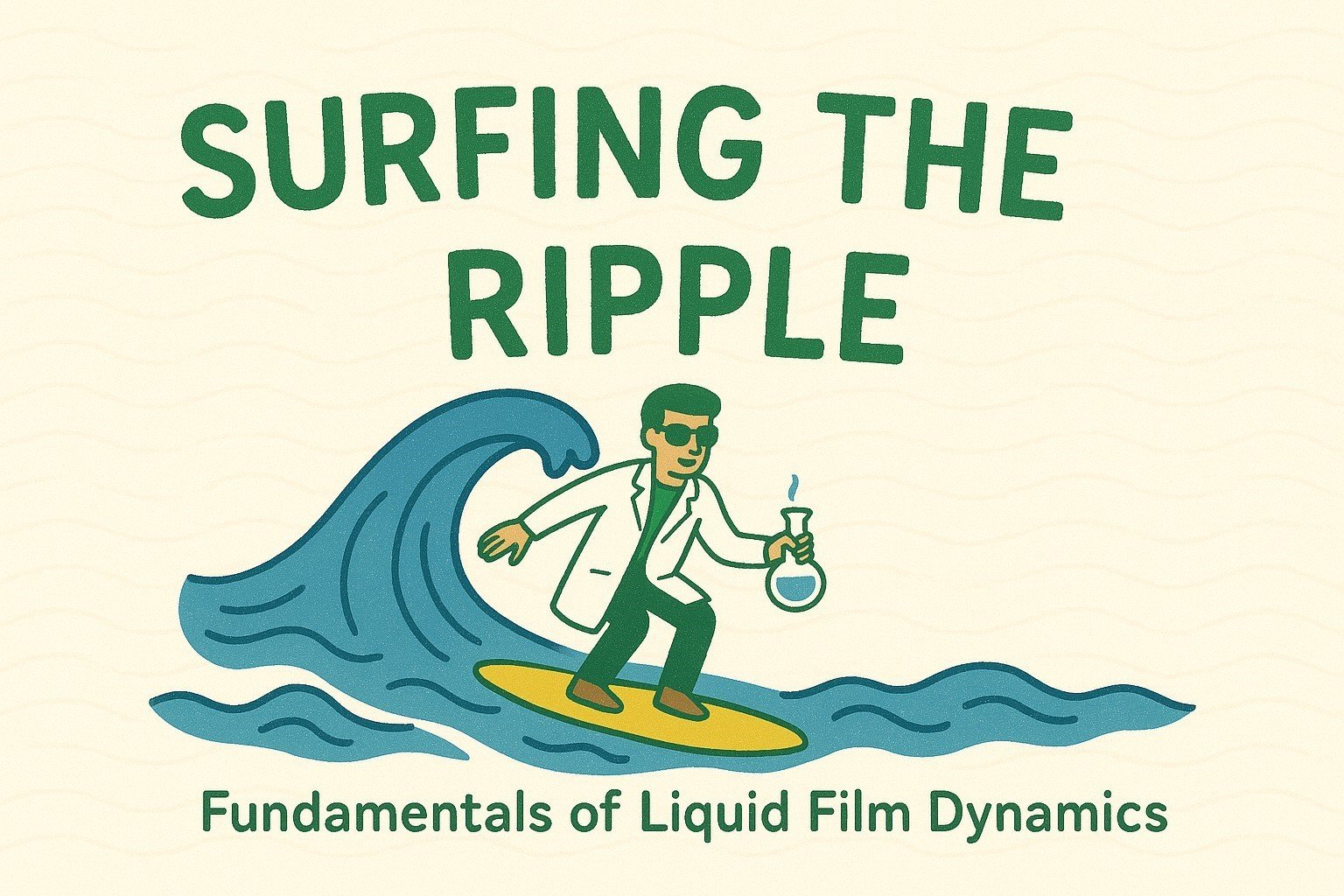Surfing the Ripple: Fundamentals of Liquid Film Dynamics
20th - 21st April 2026
University of Warwick, Coventry, United Kingdom;
in-person and online participation
Registration Deadline:Monday, 6 April 2026
Registration:
- The course “Surfing the Ripple: Fundamentals of Liquid Film Dynamics” will take place prior to the colloquium “Beyond the Free Surface: Liquid Film Flow from Theory to Applications.” If you wish to attend both events, please follow the instructions at this link.
- If you plan to attend only the course “Surfing the Ripple: Fundamentals of Liquid Film Dynamics,” please follow the instructions below.
1. Register for the event
Use this link to register for the event. Under “Registration details/Please indicate the dates of your visit,” select 20/04–21/04.
2. Complete the payment
Proceed with payment via this link. In the first dropdown menu, select “School only attendee.”
Participants are more than welcome to bring their posters to showcase their research and engage in fruitful discussions with leading experts.
Scientific objectives:

Liquid film flows are used in a wide range of technologies, from coating processes and heat exchangers micro fluidic lab-on-a chip devices. The complex physics governing these flow shave attracted the interest of generations of researchers and continue to be an active topic with major challenges for technological development. Students and early-career researchers often view this field through the lens of their specific education or research focus. This constrained perspective contrasts with the broader landscape of liquid- film science required to identify opportunities for new research avenues, design effective numerical and experimental studies, or address practical industrial problems.
This two-day course addresses that limitation by providing a structured introduction to the fundamentals of liquid-film dynamics. The programme integrates theoretical, numerical, and experimental perspectives, with sessions on multi physics modelling, dynamical-systems analysis, reduced-order modelling, numerical simulation methods, and experimental techniques for data acquisition and analysis. Special emphasis will be placed on Basilisk as a practical tool for free-surface simulations, together with discussions of experimental uncertainties and data post-processing. Moreover, industry partners will also present process case studies and highlight open research questions.
The course will take place before the 666 Euromech Colloquium: Beyond the free surface: Liquid Film Flows from Theory to Applications, which will convene leading European academics and industrial experts to discuss advances in stability, Marangoni and surfactant dynamics, thermal effects, control strategies, external-field influences, and phase-change processes. The paring of the pre-training course and the colloquium creates a focused learning pathway that combines foundational training with exposure to cutting-edge research and real-world applications. By equipping participants with essential knowledge and practical tools, the course will also enable PhD students and early-career researchers to engage with the colloquium, better follow advanced presentations, and establish productive connections.
Organising and Scientific Committee:
- Dr Fabio Pino, University of Cambridge, Cambridge, United Kingdom - postdoctoral researcher specialising in the theoretical analysis of liquid film flows. His expertise includes reduced-order modelling, stability analysis, numerical simulations, and control strategies (including machine learning), with applications ranging from coating and evaporating and condensing films to industrial systems such as hot-dip galvanising and heat exchangers. He will lead the theoretical and numerical components of the course, focusing on reduced models and machine learning.
- Dr Radu Cimpeanu, University of Warwick, Warwick, United Kingdom - an applied mathematician with expertise in scientific computing, liquid film simulations, multiphysics modelling, and feedback control. His research spans nonlinear interfacial dynamics, wave propagation, and industrial applications such as lab-on-a-chip and precision coating. He has broadexperienceinknowledgetransferandindustrialmathematics,makinghimakeycontributor to the computational aspects of the programme.
- Dr Susana Gomes, University of Warwick, Warwick, United Kingdom - is an applied mathematician specialising in PDE control, optimisation, and nonlinear dynamics, with applications to thin-film stability, coating, and heat exchange. Her expertise include passive and active control strategies, reduced models, and robust stabilisation methods. She also bringsextensiveexperienceinknowledgeexchangeandworkshoporganisation.Shewillcoordinate the theoretical components and link them with numerical and experimental work.
- Dr Emmanouil Chatzigiannakis, Eindhoven University of Technology, Eindhoven, Netherlands - is an experimentalist working at the interface of soft matter physics, interfacial rheology, and polymer–fluid interactions. His research covers thin-film dynamics,droplet/bubble coalescence, and viscoelastic interfaces. Using advanced rheometric methods, he explores interfacial stresses and their role in film stability. He will lead the experimental sessions, ensuring strong integration with theoretical and numerical perspectives.
Speakers:
- Dr. Thomasina V. Ball (University of Warwick)
- Dr. Lyes Kahouadji (Imperial College London)
- Prof. Guntars Kitenbergs (University of Latvia)
- Dr. Vrionis Panayiotis-Yiannis (The Cyprus Institute)
- Prof. Benoit Scheid (Université Libre de Bruxelles)
- Prof. Christian Ruyer-Quil (Université Savoie Mont Blanc)
Potential Participants, Proposed Programme:
The two-day training course is designed for PhD students and early-career researchers interested in liquid film dynamics and related multi physics phenomena. In addition, the course will also welcome industry practitioners aiming to strengthen the links between fundamental research and real-world applications.
We expect approximately 20-30 on-site participants. To ensure effective interaction, a minimum of 15 participants will be required, while the maximum number will be capped at 40 to maintain a focused and interactive format.
The course will be led by invited experts, including several speakers participating in the EUROMECH Colloquium. It is organised over two days: the first day will focus on theory and numerical methods, while the second will emphasise experimental techniques and industrial challenges. In addition, poster sessions will be held during breaks and in the evening, providing participants with the opportunity to present their research and engage directly with the experts.
Day 1: Theory and Numerical Simulations
Session 1: Governing Equations & Inter-facial Transport
Session 2: Numerical Simulations
Day 2: Experiments and Industrial Challenges
Session 3: Experimental Analysis
Session 4: Industrial Challenges and Open Problems
